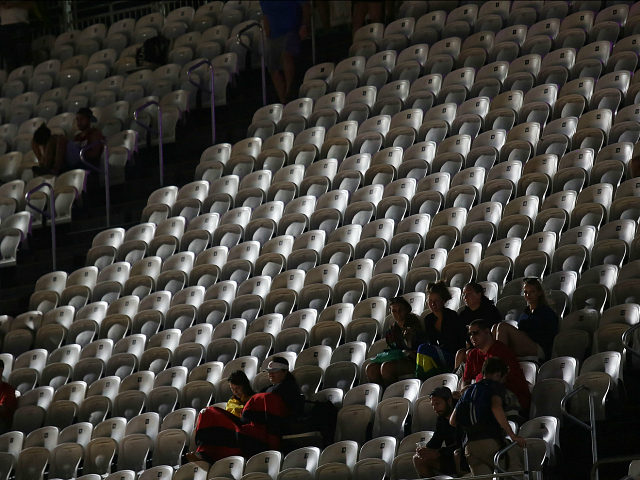Athletes and observers on television have begun to notice the small crowds at Rio de Janeiro’s Olympic events. As Olympic greats like Usain Bolt took to the track to compete in a two hundred meter heat, the large Olympic stadium was nearly empty.
“Just look at the stands and you feel like you aren’t at the Olympics,” British 1500-meter runner Chris O’Hare told the Wall Street Journal. Since the start of the Rio games, this has been a common problem for Olympic officials and athletes. As the games have progressed, the stadiums have gotten emptier. Saturday was a stark reminder that this Olympics has been consistently poorly attended by spectators.
According to the Wall Street Journal:
A few thousand seats were empty when Bolt, the Games’ marquee star, won the men’s 100-meter sprint Sunday. On Monday night, the problem was even worse as huge swaths of the stadium were empty for Shaunae Miller’s dramatic dive to win the women’s 400-meter and the hometown pole-vault gold for Brazil’s Thiago Braz da Silva.
Mario Andrada, an Olympics spokesman, has said that he blames the low attendance turnout on multiple variables. The Wall Street Journal reported that Andrada blames the low turnout on “ticketholders getting discouraged by long lines and difficult transportation on the first days of the Games. On the sales front, Brazilians are only recently starting to embrace the Olympics.”
On the first full day of the games in Rio, Breitbart News noted that multiple reports claimed that the stadiums were empty because of inefficient security and that thousands with tickets were forced to wait in long lines, with some not even making it in, due to slow security. This kind hiccup in security highlights the different factors that Andrada is blaming for the low turnout.
Some have also blamed concern regarding the Zika outbreak in Latin America for keeping foreign spectators from coming to Rio de Janeiro. Leading up to the games, the Zika crisis and fear of crime kept many away. Among those were a number of high-profile athletes. From golf to basketball to tennis, many chose not to travel to Rio, citing the danger of contracting Zika and risking their ability to start a healthy family.
According to the Russian Times, “NBA stars Steph Curry, Russell Westbrook and LaMarcus Aldridge have all announced they will sit out the event, while Antony Davis, Chris Paul and Blake Griffin are other confirmed absentees.” They also reported that “American cyclist Tejay van Garderen – whose wife is pregnant – has also pulled out, while tennis players John Isner, Dominic Thiem, Feliciano Lopez, Bernard Tomic and Nick Kyrgios will not be traveling to Brazil.” Not all on that list cited Zika as the reason for staying away.
Olympic officials are nonetheless claiming that the attendance numbers have been on a steady increase since the beginning of the Games. The Wall Street Journal reported that officials have said that they sold about 5.7 million tickets, which makes up about eighty-seven percent of the seats available.

COMMENTS
Please let us know if you're having issues with commenting.